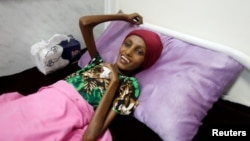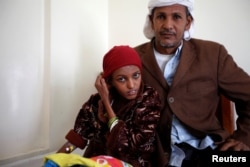Images of 18-year-old Saida Ahmad Baghili's emaciated body shocked the world and turned a spotlight on the worsening humanitarian crisis across war-torn Yemen.
Now, after weeks of specialist hospital care in the capital Sanaa, though she can still barely speak and sometimes finds eating more difficult than ever, she can at least smile.
Nearly two years of war between a Saudi-led Arab coalition and the Iran-allied Houthi movement has deepened the plight of Baghili's family and millions of other Yemenis.
In her parched village on the Red Sea coast, impoverished residents have long struggled to put food on the table.
Doctors believe her condition - which began several years before the war began - has damaged her throat and, when her family first brought her to a regional hospital in October, she could barely keep her eyes open or stand.
"We admitted Saida to find out the cause of her inability to eat and it's clear that she suffers from severe malnutrition," Dr. Wasfi al-Zakari of Sanaa's al-Thawra hospital said.
"Her health remains chronic, and her bones remain fragile due to stunted growth. In all likelihood, they will never return to normal," he said.
Her father Ahmed, who is staying nearby to be with his daughter, says her weight has reached 16 kg (35 pounds), five kilos more than when she was first admitted to hospital.
"But she doesn't eat anything except liquid medical food. She used to drink juice and milk with bananas but now she can't ... we don't know when she'll recover."
Even before the onset of the conflict in March 2015, Yemen was suffering a humanitarian crisis including widespread hunger which was brought on by decades of poverty and internal strife.
About half of Yemen's 28 million people are "food insecure," according to the United Nations, and 7 million of them do not know where they will get their next meal.







